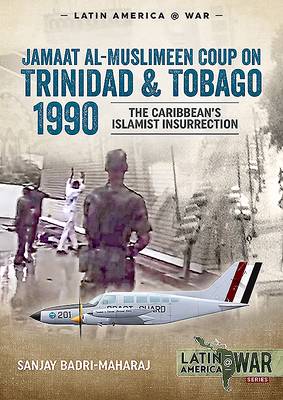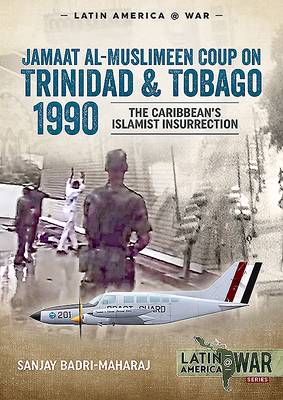
- Retrait gratuit dans votre magasin Club
- 7.000.000 titres dans notre catalogue
- Payer en toute sécurité
- Toujours un magasin près de chez vous
- Retrait gratuit dans votre magasin Club
- 7.000.0000 titres dans notre catalogue
- Payer en toute sécurité
- Toujours un magasin près de chez vous
Description
Trinidad has the distinction of contributing the highest number of recruits per capita to the cause of notorious 'Islamic State'.
The case of Trinidad and Tobago (usually abbreviated 'Trinidad') makes for an interesting study as on the face of it, a well-integrated Muslim population, a strong welfare state and an absence of political persecution on any religious or racial basis should not provide fertile recruiting ground for Jihadist ideology. However, the converse is most certainly the case as not only is attraction to such extremist causes growing but the numbers of Trinidadian nationals willing to fight for IS is also increasing. What is happening in Trinidad is symptomatic of a broader problem as Jihadi groups have widened their reach where apparently unconnected groups can now ally with the ideology and resource bases of better known groups without formally being part of them.
The flirtation with Islamist ideology on Trinidad dates back many years and through a combination of incompetence, political naiveté and unfortunate compromises. Indeed, the country faced the only Islamist coup in the entire Latin America - Caribbean region and the hemisphere.
On 27 July 1990, a radical Afro-Trinidadian Islamist group, the Jamaat-al-Muslimeen, led by Imam Yasin Abu Bakr - an Afro-Trinidadian convert to Islam previously known as Lennox Philip, and a former policeman - launched an armed insurrection with 113 of his followers. Their attack quickly sacked the entire leadership of the local government: the then Prime Minister of Trinidad, Arthur N.R. Robinson, most of his cabinet and several opposition Members of Parliament, plus the staff of the government-owned television and radio networks were held hostage for six dramatic days. The Parliament Building, the television and radio studios were occupied by armed insurgents and were severely damaged during the standoff with security forces that ensued. The Trinidad and Tobago Police Service collapsed within the first hour of the insurrection, abandoning the capital city, Port of Spain, and the military took hours to assemble a viable fighting force.
This book details the background to the dramatic events of July 1990 as well as the insurrection itself and the highly successfully military operation that quelled it. It was a coming of age for the Trinidad and Tobago Defense Force which, without requiring external intervention, contained and then defeated an Islamist uprising.
'Trinidad 1990' is illustrated by more than 100 authentic photographs from local archives, maps and color profiles, all of which serve to illustrate what became a little-known, yet highly-successful operation against international jihadism.
The case of Trinidad and Tobago (usually abbreviated 'Trinidad') makes for an interesting study as on the face of it, a well-integrated Muslim population, a strong welfare state and an absence of political persecution on any religious or racial basis should not provide fertile recruiting ground for Jihadist ideology. However, the converse is most certainly the case as not only is attraction to such extremist causes growing but the numbers of Trinidadian nationals willing to fight for IS is also increasing. What is happening in Trinidad is symptomatic of a broader problem as Jihadi groups have widened their reach where apparently unconnected groups can now ally with the ideology and resource bases of better known groups without formally being part of them.
The flirtation with Islamist ideology on Trinidad dates back many years and through a combination of incompetence, political naiveté and unfortunate compromises. Indeed, the country faced the only Islamist coup in the entire Latin America - Caribbean region and the hemisphere.
On 27 July 1990, a radical Afro-Trinidadian Islamist group, the Jamaat-al-Muslimeen, led by Imam Yasin Abu Bakr - an Afro-Trinidadian convert to Islam previously known as Lennox Philip, and a former policeman - launched an armed insurrection with 113 of his followers. Their attack quickly sacked the entire leadership of the local government: the then Prime Minister of Trinidad, Arthur N.R. Robinson, most of his cabinet and several opposition Members of Parliament, plus the staff of the government-owned television and radio networks were held hostage for six dramatic days. The Parliament Building, the television and radio studios were occupied by armed insurgents and were severely damaged during the standoff with security forces that ensued. The Trinidad and Tobago Police Service collapsed within the first hour of the insurrection, abandoning the capital city, Port of Spain, and the military took hours to assemble a viable fighting force.
This book details the background to the dramatic events of July 1990 as well as the insurrection itself and the highly successfully military operation that quelled it. It was a coming of age for the Trinidad and Tobago Defense Force which, without requiring external intervention, contained and then defeated an Islamist uprising.
'Trinidad 1990' is illustrated by more than 100 authentic photographs from local archives, maps and color profiles, all of which serve to illustrate what became a little-known, yet highly-successful operation against international jihadism.
Spécifications
Parties prenantes
- Auteur(s) :
- Editeur:
Contenu
- Nombre de pages :
- 68
- Langue:
- Anglais
- Collection :
Caractéristiques
- EAN:
- 9781913118723
- Date de parution :
- 17-09-20
- Format:
- Livre broché
- Format numérique:
- Trade paperback (VS)
- Dimensions :
- 206 mm x 292 mm
- Poids :
- 294 g

Les avis
Nous publions uniquement les avis qui respectent les conditions requises. Consultez nos conditions pour les avis.






